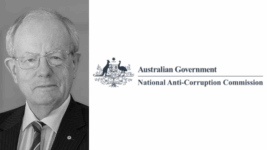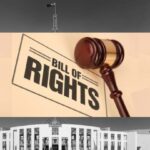NACC Commissioner Brereton and the Conflict-of-Interest Scandal That Keeps on Giving

NACC commissioner Paul Brereton’s conflict-of-interest scandal continues to unfold, as the official understanding earlier this year, that he’d resigned his role as assistant to the Inspector General of the ADF in May 2023, had shifted to his having maintained a limited consultative role to the IGADF but only on 11 occasions since heading the watchdog, and this has now jumped to 21 advisory instances.
This latest development involved the office of the Inspector General of the Australian Defence Forces correcting a previous statement made by IGADF James Gaynor to Greens Senator David Shoebridge during a 9 October Senate estimates hearing, which involved Gaynor stating that he’d engaged the assistance of the head of the integrity body on 11 occasions, when there were 10 more instances.
Shoebridge was quizzing the IGADF following September revelations that related to Brereton continuing to play a critical role in relation to the IGADF, despite his having told the Senate, via NACC chief executive Philip Reed, that he’d resigned his assistant IGADF role, which revealed a major conflict of interest as the National Anti-Corruption Commission deals with complaints about Defence.
These revelations come after the Inspector of the NACC Gail Furness determined in October 2024 that the decision of the federal corruption watchdog not to inquire into the six public officials referred to it for investigation in relation to Robodebt comprised a conflict of interest, because, despite Brereton officially removing himself from the inquiry, he still took part in its decision-making.
And even though Brereton publicly announced on 31 October 2025 that he was stepping away from all NACC defence complaint inquires, the major issue that’s revealed itself remains: how is the public to have trust in a body that was established due to a long-term need to end federal corruption and restore public trust in government, when its head has been shown to be fudging the truth?
The advice you give, when you’re not giving advice
The ABC revealed in September 2025 that despite Brereton having confirmed that he’d relinquished his role as assistant to the IGADF in May 2023, one month prior to becoming NACC commissioner, he continued to act in an advisory capacity to the Inspector General, and this was necessitated in order to assist with ongoing investigations related to the Brereton-headed Afghan war crimes inquiry.
Further, two compulsory age retirement extension forms had been submitted to Defence in relation to Brereton, and he’s currently on board with the ADF until 27 August 2026, at which time his services will likely no longer be needed. However, in the meantime, the Major General reservist continues to assist Defence and head the watchdog that probes ADF corruption complaints.
During a 7 October 2025 Senate estimates hearing, Shoebridge quizzed the NACC chief executive about the fact that his senior, Brereton, had provided him was a dubious details about his resignation from his IGADF assistant role, which appeared misleading in light of his still providing critical advice to the IGADF, to which Reed replied was true but then downplayed the significance of this.
Reed told Shoebridge during estimates that he’d personally learnt of Brereton’s ongoing role with the ADF due to a freedom of information request from the ABC. The NACC chief executive suggested that the ongoing advisory position did not comprise a conflict of interest. Senator David Pocock then put it to the NACC boss that Brereton is now undermining public trust in the body’s impartiality.
IGADF Gaynor told Shoebridge in estimates two days later that he’d been in touch with Brereton 11 times to seek advice on Afghan matters on behalf of the Office of the Special Investigator. But on Tuesday, Gaynor’s office announced it had initially neglected to include occasions in which it had been in contact with Brereton in respect of matters opened prior to his watchdog role.
Officer misconduct
The NACC’s 6 June 2024 announcement that it would not be investigating Robodebt, despite the official inquiry into the policy having provided it with a sealed section of its report recommending six officials warranting further scrutiny. These individuals consisted of five former and serving public service officials and one former minister.
Brereton had appointed a delegate to replace him for the decision on whether to progress an inquiry into this key issue that the public had expected the watchdog to investigate, as he knew one of the officials cited.
And on receiving a deluge of complaints about this outcome, Inspector of the NACC Furness launched an inquiry that found the NACC commissioner had continued to take part in the decision-making process in respect of the determination into whether to progress the NACC inquiry.
A report by ex-Federal Court Judge Alan Robertson found that Brereton had engaged in misconduct when dealing with his conflict of interest, due to a mistake of fact, as per subsection 184(3) of the National Anti-Corruption Committee Act 2022 (Cth). Robertson added that he should’ve been removed “from related decision-making processes and limit his exposure to… information”.
Following the release of the report, the INACC found that the NACC commissioner had engaged in officer misconduct, as natural law provided that he should not have engaged in the inquiry decision-making. She added that if the NACC had been the doer of these actions itself, it would have amounted to agency maladministration.
Hidden behind closed doors
The NACC was supposed to fill the promise of a federal ICAC, or a body based on the NSW anticorruption commission, which has a reputation for ruthlessly uncovering the wrongdoing of that state’s politicians. However, the federal body is synonymous with ideas that involve overlooking the questionable behaviour of mates, as well as holding a distinctly opaque outlook.
This has been apparent from the establishment of the NACC. Indeed, the NSW ICAC holds public hearings that promote transparency. So, when Morrison government attorney general Christian Porter spruiked an integrity body in late 2018 that would hold hearings about politicians in secret, while those involving law enforcement officers would be in public, this scenario was widely decried.
The Albanese government then won the 2022 federal election on the promise of open government and a federal integrity watchdog with teeth, which on opening its door on 1 July 2023, turned out to be a body that holds all of its hearings for the entire public sector in secret.
Section 73 of the National Anti-Corruption Commission Act (Cth) ensures that a NACC “hearing must be held in private, unless the commissioner decides to hold the hearing, or part of the hearing, in public”. In order to hold public hearings, the office bearer must be satisfied that “exceptional circumstances justify” it and that “it is in the public interest to do so”.
Pocock and Senator Jacquie Lambie raised an amendment to a NACC omnibus bill in October last year, which sought to remove the secrecy provision related to NACC hearings. However, whilst it received the support of the entire crossbench, the majors voted it down.
The Saturday Paper revealed in October that despite Albanese and his promises to propagate open government, when former attorney general Mark Dreyfus had favoured giving the NACC more discretion to hold open hearings, the PM wouldn’t have it, and only approved the chief lawmaker’s third model in September 2022, as the earlier versions of the NACC had teeth too sharp for his liking.







